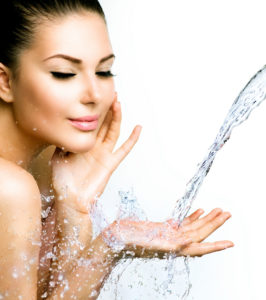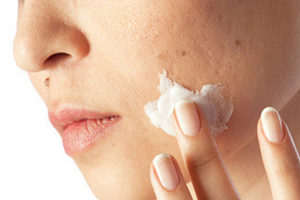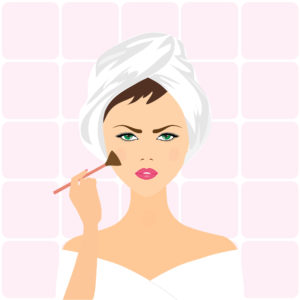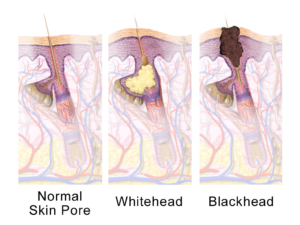Acne- The 411
Living with acne, whether severe or mild can significantly impact the way you feel about yourself in your day to day life. It is thought that 80% of all people between the age of 11 and 30 have suffered with acne at some point in their lives. Whilst there is no official ‘cure’ for acne, your skin care routine can help reduce its severity. Many consider makeup to be a cause of Acne and to some extent this is true however, with the right skincare routine followed by applying carefully selected makeup products, you can reap the benefits of calmer and concealed skin.
Acne is a condition of the hair follicles on the fast, chest and back which manifests its self in comedones (blackheads and whiteheads), pustules (puss filled spots), pimples (sensitive red bumps) and, cysts (deep pimples).
What causes acne?
Acne occurs when oil producing glands are particularly sensitive to normal levels of hormones in the blood and subsequently produce too much oil. The build up of oil in acne prone skin provides an ideal area for bacteria to multiply causing inflammation and puss-filled spots. Furthermore, those who’s skin is prone to acne do not shed dead skin properly causing the follicles to clog up resulting in blackheads and whiteheads.
Active ingredients to look out for in both skin care and makeup.
When caring for acne prone skin, there are 4 holy grail ingredients to look out for which are common in a huge variety of products from low to high price points. They are:
- Salicylic acid – Derived from bark and is a great exfoliate whilst also having anti-inflammatory properties.
- Glycolic acid – A chemical exfoliate which prevents the dead skin cells from being held to the surface of the skin. Recent studies have also shown tha it promotes the production of collagen (key for repairing the skin).
- Benozl peroxide – Targets bacteria contributing to acne.
- Tea tree oil – Contains anti-inflammatory and anti-bacterial properties whilst also contributing to clogging pores.
Daily skincare for acne prone skin
 1) Cleanse: Cleansing the skin removes dirt, oil and other unwanted substances from the skin, it is important as throughout the day your face comes into contact with a plethora of unwanted pollutants, viruses, dirt and dead skin cells. Cleansing is especially important for acne prone skin through its unclogging of pores which would otherwise lead to spots. If you are looking for a new cleanser for your acne prone skin I recommend using:
1) Cleanse: Cleansing the skin removes dirt, oil and other unwanted substances from the skin, it is important as throughout the day your face comes into contact with a plethora of unwanted pollutants, viruses, dirt and dead skin cells. Cleansing is especially important for acne prone skin through its unclogging of pores which would otherwise lead to spots. If you are looking for a new cleanser for your acne prone skin I recommend using:
- La Roche Posay Effaclar Purifying Cleansing Gel (£13) which is suitable for the most sensitive of skin containing only the bare essential ingredients. Great for oil control and proven to reduce the visibility of spots and blackheads.
- Dermalogica MediBac Clearing Skin Wash (£44) contains salicylic acid and camphor to reduce inflammation alongside tea tree oil to help eliminate breakout causing bacteria.
2) Toner: Toner is important for re-balancing the PH of the skin and removes excess oil (vital for preventing Acne). I recommend using:
- La Roche Posay Effaclar Clarifying solution (£12) is formulated with glycolic and salicylic acid which work in harmony to remove dirt and toxins from pores.
- Dermalogica breakout clearing all over toner (£34). contains salicylic acid and argon to reduce redness and skin aggravation caused by break outs. This can be used all over the body too!
 3) Moisturise: Applying moisturiser to a clean face creates the perfect canvas for makeup application and prevents dry patches that cause makeup to cake and look unnatural. Those with acne prone skin are often wary of using moisturiser daily as they fear that it will contribute to their oiliness and result in blemishes. In reality, many moisturisers are very beneficial for acne prone skin, I recommend using:
3) Moisturise: Applying moisturiser to a clean face creates the perfect canvas for makeup application and prevents dry patches that cause makeup to cake and look unnatural. Those with acne prone skin are often wary of using moisturiser daily as they fear that it will contribute to their oiliness and result in blemishes. In reality, many moisturisers are very beneficial for acne prone skin, I recommend using:
- Avene Clearance expert (£11) which contains exfoliating properties to stop bacteria causing acne causing breakouts.
- Bioderma Hydrabio Gel-Crème (£12) which releases moisture and soothing properties to your skin throughout the day.
- La Roche Posay Effaclar Duo (£11) which contains salicylic acid.
Makeup tips and tricks for acne-prone skin
1) Prime: When covering acne with makeup, primer is your best friend if you use products with blurring and/or colour correcting properties (green primers are a great way to mask the redness of acne prone skin). Many primers even contain acne fighting ingredients such as tea tree oil and salicylic acid. Make sure to read the ingredients of the products you are using as those with oily skin should opt for oil-free formulas. Primers work best on prepped skin that has gone through the above skincare routine.
2) Foundation: This is by no means compulsory when applying makeup to acne prone skin but if you chose to apply foundation make sure you pick one that does not clog your pores or irritate your skin. Using a mineral based or oil free foundation is the best port of call and many on the market even contain active ingredients to help you fight off acne. When trying to cover acne, large quantities of foundation are not always needed and it is best to view foundation as giving you a base with the concealer doing the more heaving duty covering.
3) Concealer: When covering specific blemishes, the right concealer can make your skin look flawless. In terms of actual application, I recommend warming the concealer in your hands before application and placing a tiny amount on the head of the blemish. Concealer is best able to cover blemishes when patted in with a clean dry finger as it allows precision and the product to fuse with your base.
 4)Powder: If you have applied foundation and/or concealer powder will make it last all day. Furthermore, mattifying powders are a powerful tool to control your oil.
4)Powder: If you have applied foundation and/or concealer powder will make it last all day. Furthermore, mattifying powders are a powerful tool to control your oil.
The most important aspect of covering acne prone skin with makeup is TAKING IT OFF, you should never sleep in your makeup especially with acne prone skin as your pores will become clogged and more symptoms of acne will appear.






